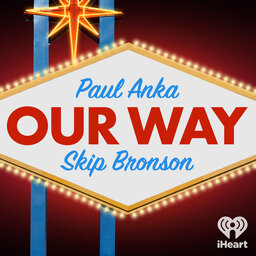Catching Up With Paul Anka and Skip Bronson
The 'Our Way' producers turn the tables on Paul and Skip and interview the hosts about their legendary careers. Skip looks back on his early life before becoming a hugely successful real estate developer and business visionary, and reflects on all the pranks he and Paul have pulled on one another. Paul recalls the unrequited high school crush that inspired “Diana,” the 1957 hit that transformed him from a small-town Canadian teen to an international pop star, the time he did battle with the US Customs office, and his relationship with Johnny Carson — including the night that the talk show legend fall afoul of the Mob…with disastrous results!
 Our Way with Paul Anka and Skip Bronson
Our Way with Paul Anka and Skip Bronson


